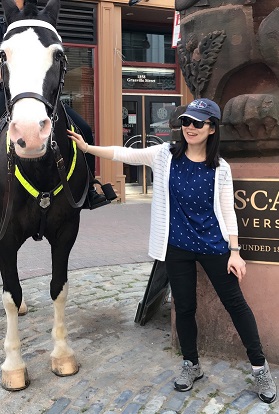 Jingjing is a PostDoc under the supervision of Dr. Mark Lewis, Dr. Hao Wang, and Dr. Evelyn Merrill, in the department of Mathematical and Statistical Sciences and the department of Biological Sciences at the University of Alberta, working on the cyanobacterial blooms in Alberta lakes and the chronic wasting disease (CWD) in deers.
Jingjing is a PostDoc under the supervision of Dr. Mark Lewis, Dr. Hao Wang, and Dr. Evelyn Merrill, in the department of Mathematical and Statistical Sciences and the department of Biological Sciences at the University of Alberta, working on the cyanobacterial blooms in Alberta lakes and the chronic wasting disease (CWD) in deers.
Jingjing’s previous research focused on using mathematical models to explore the mechanisms that promote the emergence and maintenance of cooperation in nature. What force drives the seemingly altruistic behaviours of individuals in nature, that benefit others in the cost of their own? Examples include workers in honey bee colonies and helpers in cooperatively breeding species.
Jingjing studied the ecology and evolution of dispersal in metapopulations in the University of Western Ontario for the PhD degree in Applied Mathematics. This research is related to the evolution of a special form of cooperation, that is, cooperative breeding. The study includes examining the effect of delayed dispersal of helpers on the persistence of a metapopulation with structured local populations, and exploring the impact of environmental constraints on the evolution of helping behaviors in cooperative breeding species. Tools, such as, dynamical system analysis, computational simulations of population, kin selection model, perturbation theory, etc. have been used.
Jingjing’s research project for Master’s degree in Applied Mathematics in Beijing Normal University (BNU), China, include two sub-areas in theoretical ecology. One is the evolution of cooperation with hierarchical structure, utilizing tools including replicator equations, evolutionary game theory, and bifurcation theory. The other one was related to the evolution of a matrilineal society, Mosuo, in southwestern China.
Jingjing’s Bachelor (Applied Mathematics, BNU) project is on population dynamics, using time series to explain and predict the population of a type of ground squirrel in China. It is this project that inspired Jingjing to step into the study of mathematical biology.
Presentations
2020
Modelling the Spread of Chronic Wasting Disease in Mule Deer Based on Their Home Range Behavior. Oral presentation, Wang Lab Meeting, September 22, 2020.
The spreading speed of Chronic Wasting Disease influenced by density and sex ratio. Poster presentation, ACTWS 2020, Camrose, AB March 13-15, 2020 (cancelled due to COVID-19)
The Spreading Speed of Chronic Wasting Disease Influenced by Density and Sex Ratio. Oral presentation, Lewis Lab Meeting, March 9, 2020.
Using Bayesian Networks to predict cyanobacterial blooms and identify the primary covariates. Oral presentation, Wang Lab Meeting, March 3, 2020.
2019
‘Paradox of Enrichment’ in Metapopulations with Delays. Oral presentation, Applied Math Seminar, Department of Mathematics and Statistics, University of Ottawa, November 13, 2019
Using Bayesian Networks to Analyze Cyanobacterial Blooms — Application of Structure Learning. Oral presentation, Math Biology and Differential Equations Study Group, Department of Mathematical and Statistical Sciences, University of Alberta, September 25, 2019
Using Bayesian Networks to Analyze Cyanobacterial Blooms. Oral presentation, Lewis Lab Meeting, September 23, 2019
Modelling Chronic Wasting Disease in Mule Deer. Oral presentation, Levin Fest 2019, University of Victoria, June 15, 2019
Modelling Chronic Wasting Disease in Mule Deer. Oral presentation, 2019 CAIMS Annual Meeting, Whistler, BC, June 9-13, 2019